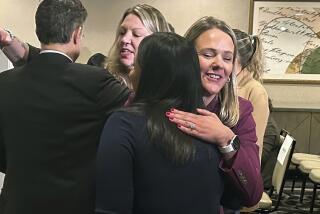Palo Alto Blood-Test Worker Caught Reusing Needles
- Share via
PALO ALTO, Calif. — At least 3,600 people who had blood work performed at a lab are being warned to get tested for HIV and hepatitis B and C after a technician admitted reusing needles since June 1997.
Any patients sent to the SmithKline Beecham Clinical Laboratory since the technician began working there could be at risk, state health officials said Friday. Letters warning of the risks are being mailed this weekend.
“We believe the risk of anyone being infected is extremely low,” said Dr. Jon Rosenberg, the state epidemiologist directing the investigation. Still, “we believe these people have the right to be notified.”
The technician, a woman in her 50s who has since been fired, typically worked alone. She told investigators that she washed the needles with water and diluted hydrogen peroxide, then put them in clean needle containers before drawing blood from patients with difficult-to-pierce veins.
No one knows how often she did this, or why, although investigators who interviewed her said she apparently didn’t do it maliciously. Her name was not released.
“There’s nothing she said that suggests she was deliberately putting patients at risk even though at some point she realized that it was wrong,” Rosenberg said.
SmithKline only learned what she was doing after a co-worker discovered the needles being washed in a sink and “was nauseated,” said Dr. Ed Kaufman, national medical director for SmithKline Beecham labs.
“Clearly we are both shocked and baffled by this practice. It’s a breach of medical care,” Kaufman said at a news conference with Rosenberg. “She can’t explain why she did it.”
Rosenberg said the risk of anyone being infected is low because drawing blood is less likely to transmit viruses than injections, because the woman claimed she only reused needles occasionally and because the hydrogen peroxide would kill some viruses.
Still, doctors at Stanford University Hospital, which is adjacent to the lab, were alarmed. The lab is not affiliated with the hospital
“It breaks a lot of rules we teach our staff here not to do,” said Jim Schweikhard, director of environmental health and safety at the hospital. “It really puts patients at risk for various diseases.”
Jerri Paley, who had blood drawn at the lab in November, had her blood tested Friday for HIV and hepatitis B and C. “I’m upset,” she said. “I just want to find out what the results are.”
The technician, who was trained as a phlebotomist in 1994 and certified to draw blood by SmithKline after a company training program, also worked at several other laboratories in the San Francisco Bay Area.
The state and county health departments “are intensively investigating every one of those places” although they have no evidence that she reused needles elsewhere, Rosenberg said.
Since it learned of the problem on March 22, SmithKline has reviewed training procedures at its 800 blood-test sites throughout the country, and is satisfied that its training procedures are adequate, Kaufman said.
More to Read
Sign up for Essential California
The most important California stories and recommendations in your inbox every morning.
You may occasionally receive promotional content from the Los Angeles Times.













